






Chapel Elementary School students are well-rounded, excel academically, thrive socially, and grow academically. They are empathetic, self-aware, and autonomous learners, demonstrating responsible and assertive attitudes toward their education. In our caring environment, students respect and accept differences, cultivate open-mindedness, and are capable of making informed, balanced, and principled decisions. Daily experiences allow them to develop resilience to face challenging situations and think critically. An integrated curriculum induces them to become confident communicators and worldly citizens, sharing knowledge and experiences, and ultimately becoming responsible, lifelong, and autonomous learners.
Language is developed in English and Portuguese. In the American Program, we employ phonics for English reading and writing. In the Brazilian Program, Portuguese language instruction embraces Emilia Ferreiro’s teachings and Jean Piaget’s constructivist approach. The English language acquisition process starts in Pre I, and formal literacy instruction in Portuguese begins in 1st grade.
Its spacious, well-ventilated, and well-lit classrooms hold a maximum of 18 students in 1st grade and up to 26 students in 2nd through 6th grades.
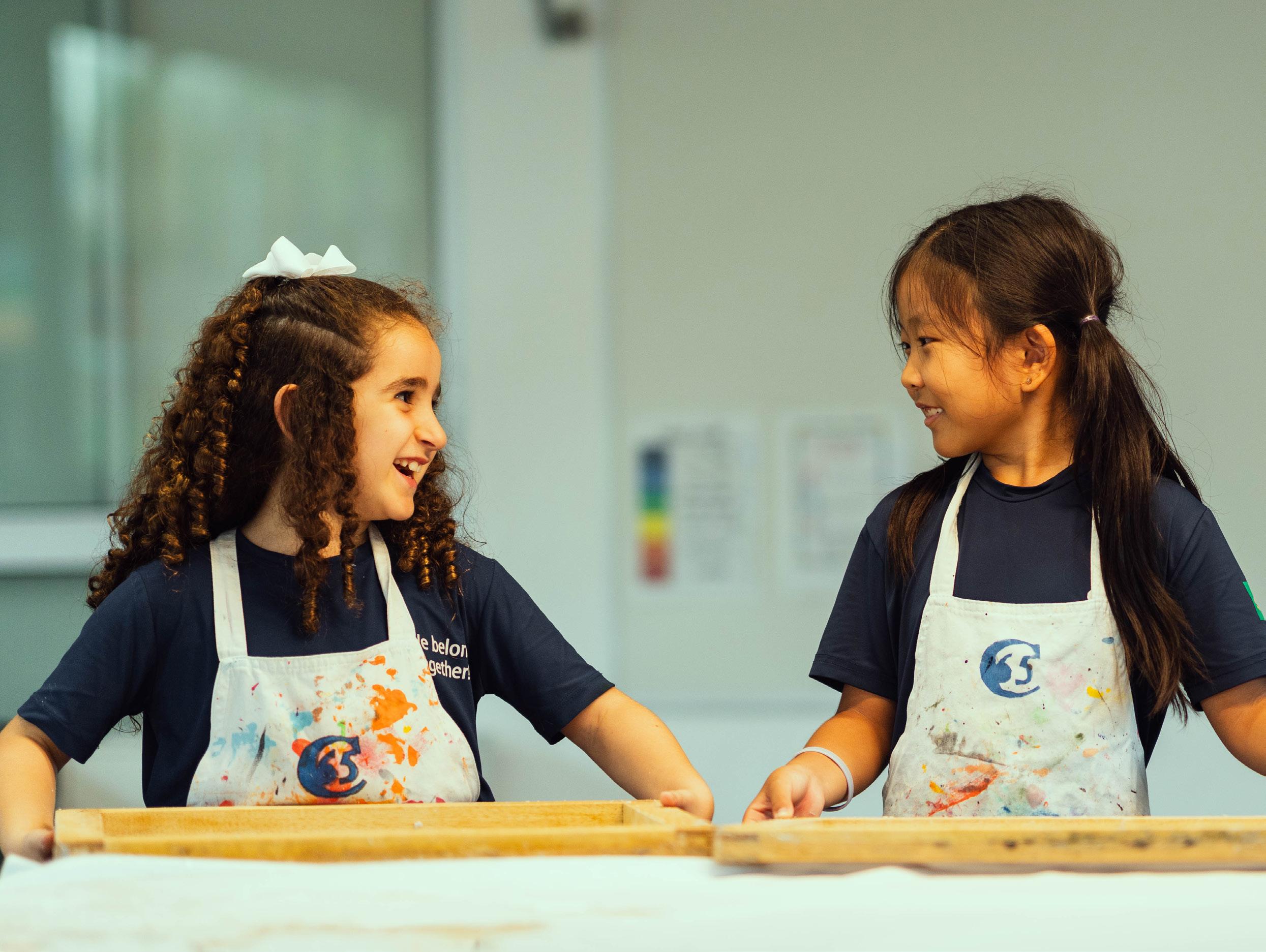


Its academic calendar mirrors the American model, commencing in July and ending in mid-June, with breaks in June/July and December/January. Students engage in full-day classes from 8 a.m. to 3:10 p.m., with breaks for morning snacks and lunch (provided by Chapel’s Food Service), as well as an afternoon break. Extracurricular activities, ranging from sports to arts, STEAM (the acronym for science, technology, engineering, arts, and math), and Chinese, are available from 3:20 p.m. to 4:20 p.m., thus catering to diverse interests and age groups. These optional activities allow students to explore their passions and talents beyond the classroom.
At Chapel, our pedagogical approach places the student at the forefront of learning. Students engage in collaborative activities in every classroom, delving into research, sharing insights, and analyzing information to enhance their academic and social skills.
Our curriculum is aligned with the Common Core standards for the American curriculum, and with the BNCC (Base Nacional Comum Curricular) for the Brazilian curriculum. Additionally, we integrate the Responsive Classroom program (RC), which prioritizes the emotional development of students alongside their academic progress. Through interactive lessons, our CARES classes focus on fostering cooperation, assertion, responsibility, empathy, and self-regulation skills.
Students participate in weekly CARES classes each semester, engaging in team-building activities and discussions around a specific skill. In the second semester of 5th grade and continuing into 6th grade, our students embark on CARES for Life classes, addressing relevant teen-centric topics, from sexuality to navigating social media. Furthermore, our socio-emotional curriculum includes the ABRACE Program, which engages the school community in anti-bullying initiatives.
In the Elementary School, each day begins with morning prayer, setting a reflective tone for the day ahead. Following this, students engage in the Responsive Classroom (RC) morning meeting, a cherished time to connect with their peers and teachers, and learn about the day’s schedule and learning objectives. These sessions also serve as a platform for nurturing peer relationships, reinforcing classroom norms, and fostering a sense of belonging and community.
RC morning meetings are designed to evolve over the years, according to the needs of each group, and are age-appropriate. Initially, the focus is on teaching procedures, establishing routines, and cultivating appropriate social interactions. As students progress, the emphasis shifts toward honing communication skills and nurturing critical thinking abilities.
Our daily schedule accommodates various subjects, including English, Portuguese, Brazilian Social Studies, Mathematics, Science, Music, Arts, Physical Education, Religion, and Learning Innovation. Technology seamlessly integrates into our curriculum, enriching learning experiences across all subjects.
Beyond academics, our curriculum places a strong emphasis on socio-emotional development. Recess and lunch breaks allow students to unwind
and engage in supervised play in our safe and expansive outdoor facilities, which include a soccer field, sports courts, and playground.
At the close of each school day, teachers and students come together to reflect on their academic and social achievements, setting the stage for another successful day of learning ahead.

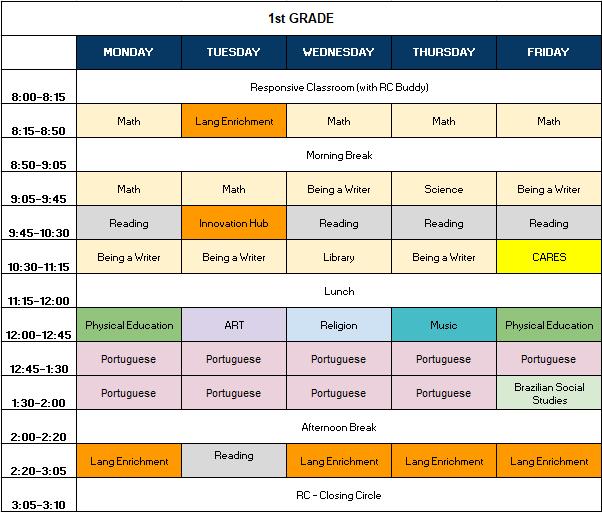
Our Elementary classes instill a sense of responsibility and self-assessment in students, fostering their growth as independent learners. Students are empowered to set and track individual learning goals tailored to their unique needs and aligned with learning objectives.
Student performance is closely monitored by teachers and our counseling team. With one counselor serving students in grades 1 through 3, and another for grades 4 through 6, we assist students, parents, and teachers across academic, personal, and social domains.
Our counselors collaborate proactively with teachers to identify students requiring additional support or academic enrichment. Together, they develop learning plans, implement differentiated instructional strategies, and recommend external interventions as needed. Regular meetings involving parents, teachers, and counselors facilitate ongoing monitoring and assessment.
In cases requiring more intensive support, such as developing an Individual Education Plan (IEP), our interdisciplinary team collaborates to establish clear learning goals, define effective strategies, and outline needed instructional adaptations. A strong partnership between the school and families is essential to support the student’s holistic development.
In our classrooms, students actively engage in small group activities and benefit from differentiated instruction. This approach involves tailoring lessons to meet the diverse needs of students, whether this implies adjusting the content, learning process, or expected outcomes. Differentiation ensures each student the support needed to achieve their full potential. Students who demonstrate readiness to advance are also provided with challenging activities to stimulate their growth even further.
Regular progress reports are issued quarterly, offering insights into the students’ journey toward their goals. Periodic meetings between teachers and parents serve as a valuable opportunity to provide accurate feedback, and ensure holistic support for the student’s academic and socioemotional development. Through these collaborative efforts, we strive to create an environment where every student can flourish and succeed.



In Elementary School, a primary goal is to build a strong literacy foundation, thus ensuring that students attain fluency in both English and Portuguese by the end of 6th grade. Writing instruction is an integral part of this process, facilitated through the Being a Writer (Formando Escritores) programs. These programs foster a collaborative writing community, guiding students through key stages, such as brainstorming, peer editing, writing, sharing texts, and reflection. What sets these programs apart is their emphasis on regular analysis of student work by both teachers and peers, as well as the promotion of idea-sharing within the group and formal presentation of final versions, whether to classmates or for publication.
In addition to regular Portuguese and English classes, elementary students benefit from daily sessions with specialist teachers for reading instruction in English. These specialists lead small Guided Reading groups in collaboration with classroom teachers, focusing on developing essential reading skills.
Chapel’s Elementary School features the Everyday Mathematics program, developed by the University of Chicago. At its core, this program promotes daily immersion in mathematical concepts, fostering in-depth understanding through real-life, hands-on experiences. Students gain a solid foundation in numeration, operations, data analysis, and geometry by using concrete examples and materials.
Everyday Mathematics is characterized by a spiral approach, with an emphasis on repeated exposure to concepts and skills, and cultivating long-term mathematical memory. Students reinforce their understanding through engaging games and interactive activities, and develop problem-solving strategies.
This dynamic approach ensures that students engage meaningfully with math, and builds confidence and proficiency as they navigate increasingly complex challenges.
In Chapel’s Music program, students are encouraged to explore various instruments and movements to nurture their musical talents. Students explore playing, improvising, and composing music. Throughout their Elementary School journey, students learn how to play the recorder, xylophone, and percussion instruments. The Music Department showcases its curriculum each year and invites parents to two events, the Christmas Concert for Lower Elementary School (1st to 3rd grades) and the Music Concert for Upper Elementary School (4th to 6th grades).

Our Visual Arts curriculum explores fundamental artistic elements such as lines, colors, shapes, textures, light and shadow, composition, and spatial relationships. Students are exposed to various artistic techniques, including painting, sculpture, drawing, and collage to expand their creativity and selfexpression. Additionally, Chapel’s art collection, with about 400 pieces displayed across hallways and classrooms, transforms our school into an art gallery. This immersive environment enhances the student’s appreciation for art, and inspires their artistic endeavors.
Science education in Elementary School at Chapel is aligned with Next Generation Science Standards (NGSS), which empower students to grasp fundamental scientific concepts, delve into specific topics (such as cause and effect, energy and matter, systems and scales), and apply the scientific process. Beyond content mastery, our program fosters global perspectives and cultivates scientific inquiry skills. To arouse the student’s curiosity, we have a Learning Innovation Hub. Here, students are inspired to engage in handson experimentation, utilizing various materials to explore and apply scientific principles in workshop and laboratory settings.
Our Learning Innovation program, crafted through extensive research, and inspired by the STEAM approach (Science, Technology, Engineering, Arts, and Mathematics), seeks to integrate these five areas seamlessly. Rooted in the Four C’s - critical thinking, creativity, collaboration, and communication - the projects nurtured at our hub aim to go beyond isolated experiences. Our goal is to embed this culture across the subjects.
This structured, cross-disciplinary approach innovates how our students engage with learning. They explore their interests, and take ownership of their education using a variety of technological tools and resources. When designing projects, students follow the Engineering Design Process, and embrace learning opportunities through trial and error.
Technology plays an integral role in the daily lives of both students and teachers. Children are taught about the benefits and challenges of media and online networks from an early age. Chapel is proud to be certified by Common Sense Media. At the start of each school year, its Elementary School students actively participate in the Digital Citizenship Program developed by this organization. This program equips students with essential digital literacy skills by addressing topics like online security, cyberbullying, and copyrights. Beginning in 3rd grade, students are given a school email account for educational purposes only. The Elementary School curriculum also focuses on developing communication skills, including creating portfolios, presentations, and digital editing.
In Elementary School, Physical Education classes aim to instill a passion for physical activity, promote a lifelong commitment to fitness, and cultivate sportsmanship. Students enhance their motor skills, cognitive abilities, and socio-emotional development through diverse activities

and games. Moreover, Physical Education fosters essential values like discipline, teamwork, respect, and perseverance. The classes focus on individual and team goals, personal responsibility and dedication, and play a pivotal role in character-building and nurturing healthy individuals.
Chapel aims to educate individuals to achieve their fullest potential. In addition to academic, physical, and socio-emotional development, it nurtures a spiritual journey among its students and faculty. Its Religion classes offer a comprehensive curriculum, encompassing biblical studies, values, and ethics. Rooted in Christian values, its Religion curriculum is designed to foster discussion, selfreflection, and character development. It embraces students of all religious backgrounds, encouraging them to share their diverse experiences.
All students participate in Religion classes, Prayer Services (for 1st-3rd grade students), and Masses (for 4th-6th grade students), held throughout the school year in observance of religious holidays and saints.
The Christian values of the community are strengthened by celebrating the student’s First Communion at school, with preparatory classes (catechesis) integrated into the 3rd grade curriculum. Chapel School has a Catholic chapel that conducts masses in English, and members of the school community are welcome to attend on Sundays.
At Chapel, learning extends far beyond the classroom walls. Beginning in 1st grade, students embark on enriching field trips designed to complement their socio-emotional development and academic curriculum. Each trip is carefully planned to enhance interdisciplinary learning and reinforce classroom concepts.
For students in 1st and 2nd grades, cultural day trips are the norm, providing immersive experiences that spark curiosity and cultural appreciation. From 3rd grade onward, students venture on overnight trips to educational resorts across São Paulo state. Here, they engage in cultural, artistic, and recreational activities, spanning over multiple days, fostering teamwork and exploration.
Chapel maintains two libraries for students, with resources to enrich teaching and learning. The libraries are modern, airy, and cozy. The Elementary School library has a collection of 10,500 books in English and Portuguese. The library also maintains premium subscriptions to databases and books such as Ebsco Explora Primary and TumbleBooks. These resources offer children’s books in English in an e-book format with animations, activities, and games. Likewise, there is a database geared to supplying reading material in Portuguese called Árvore de Livros, which serves 3rd and 4th-grade students. National and international newspapers are offered in print and digital format, including the children’s newspaper Joca, with individual subscriptions for fifth- and sixth-grade students.
Students from 1st and 2nd grades participate in storytelling sessions, and all grades periodically receive visits from writers, and
perform activities related to reading. The library also has a place for lectures or exhibitions, in addition to traditional library activities. Every year, the library team organizes the Book Fair with literary activities aimed at all grade levels, and offers national and imported books at cost.
Elementary School students visit the library regularly to choose books categorized by the Lexile System. The Lexile System indicates the level of English comprehension required for reading each book. Parents are always welcome to borrow books to read at home with their children.
Chapel School’s PTA collaborates closely with our Educational Leadership to enhance events and sports activities in alignment with the current school year calendar. Additionally, they collaborate closely with our Athletic Director to ensure the Booster Snackbar operates seamlessly during JV and Varsity home games, serving students and families.
It’s important to note that while the PTA plays a vital role in enriching our school experience, it does not engage in the daily operations or management, be it academic or administrative, which falls under the school’s leadership. We sincerely appreciate the invaluable contributions of all PTA volunteers who generously donate their time and efforts. Although they forego compensation, they have a tremendous positive impact on our school community.
Chapel classrooms are equipped with multimedia projectors, digital whiteboards, and integrated sound systems, creating a dynamic learning environment. Students can access over 400 devices, including laptops, Chromebooks, and iPads, all connected through a high-speed wireless network. These devices are housed in specialized areas such as the Innovation Hub, Makerspace, Technology Lab, and multiple Mobile Labs, thereby integrating technology into classroom instruction.
Chapel School’s modern infrastructure is situated on a spacious and green campus that covers more than 40,000 square meters, including a constructed area that exceeds 13,000 square meters. Facilities include an official-sized football field, a sports gym, a climbing wall, a covered multi-sport court, a tennis court, a workout gym, a multi-purpose auditorium with a capacity for 784 people, conference and video conference rooms, a chapel for student liturgical activities and celebrations and Sunday mass, the infirmary, three Science labs, an Integrated Science
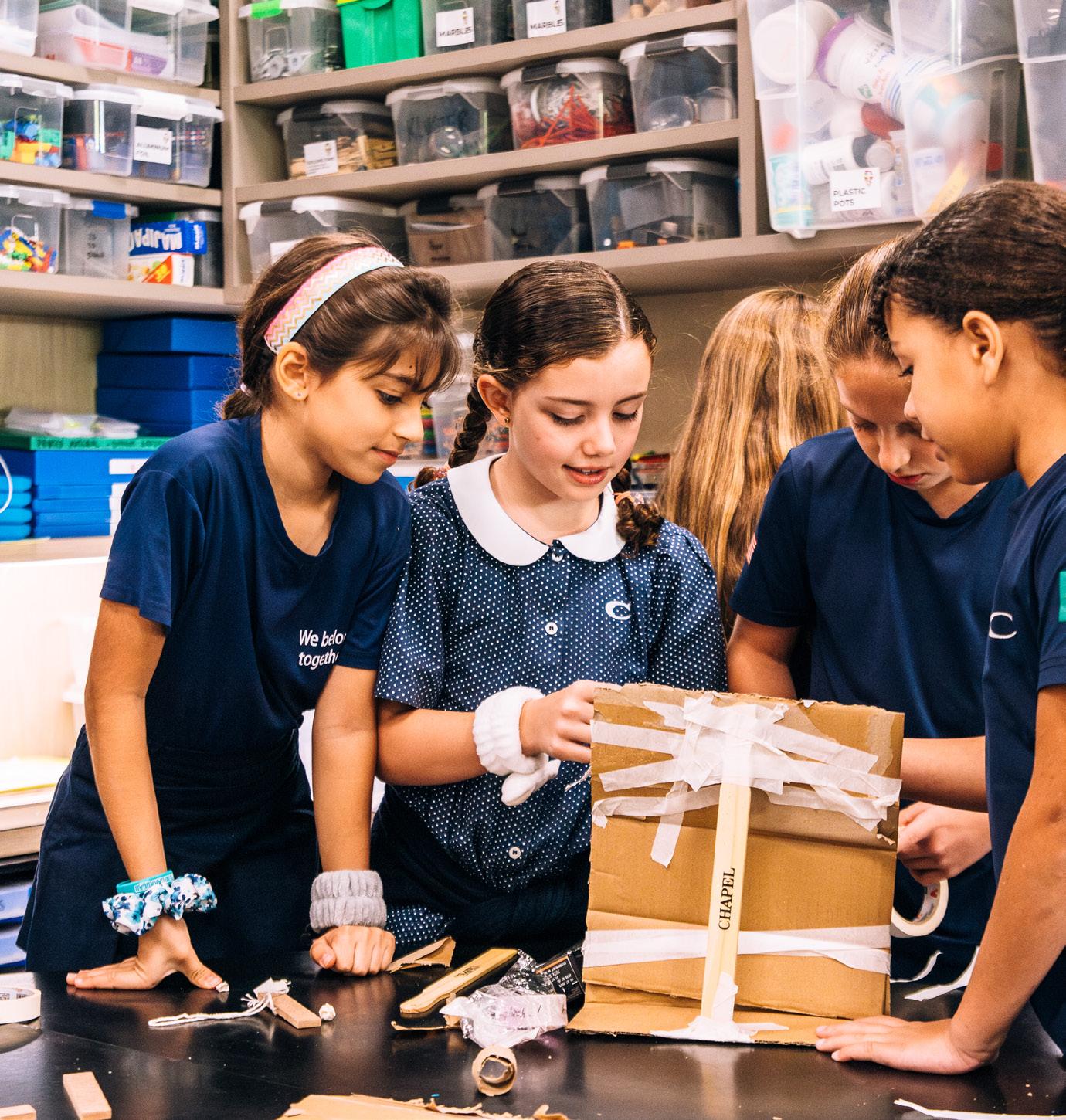

room, two art studios (one integrated with the environment), a music room, two libraries, three playgrounds for different age groups, a cafeteria for students, teachers, and staff, and female and male changing rooms in the sports gym. The school also has an artesian well and a power generator.
Chapel is located on a highly safe campus with only one entrance and one exit. School buses and vans that transport students have access to school grounds, and all students board and disembark within the school’s campus. Cameras and security personnel monitor buildings 24/7, following strict access protocols. Windows in all classrooms have been treated with bulletproof film.

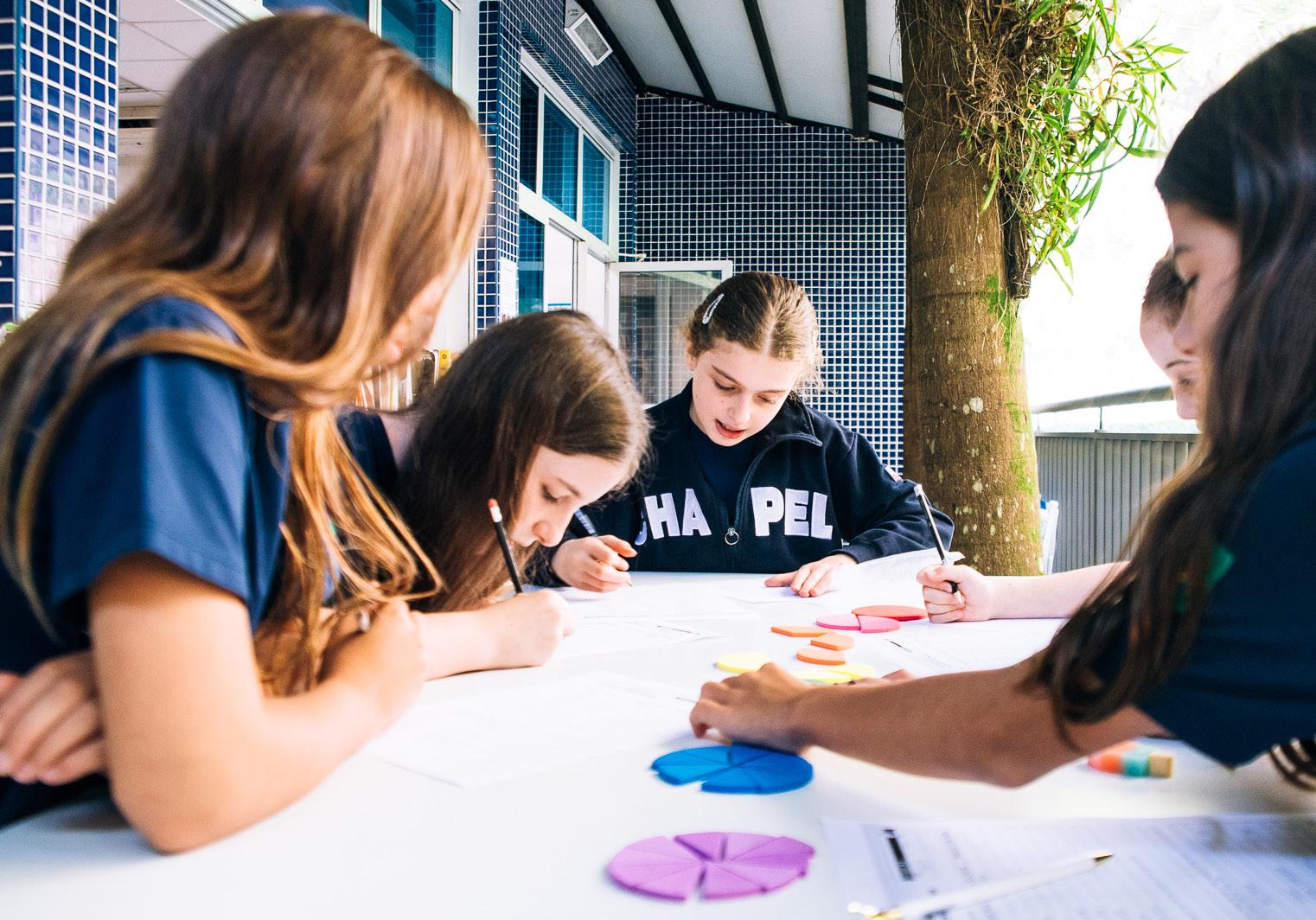

Is Chapel an international school? What characterizes an international school?
Chapel is an International American school in Brazil. Its official language is English, and the only subjects taught in Portuguese in Elementary School are Portuguese (language) and Brazilian Social Studies (BSS). In high school, students can take French and Spanish electives. Students follow both Brazilian and American curricula and start the IB curriculum in the 11th grade. Chapel follows the calendar of the Northern Hemisphere: the school year begins in August and ends in June of the following year. Students can receive up to three diplomas when they graduate from High School: American, Brazilian, and International Baccalaureate (IB).
Is Chapel recognized as an American school?
Chapel was founded in the 1940s as a parish school for children of American families living in São Paulo. As such, it has always been an American school in Brazil. Since then, its activities have expanded, and today Chapel offers three diplomas - American, Brazilian, and International Baccalaureate (IB) - which are valid from Early Childhood Education to High School. The curriculum and pedagogical approach have been structured to prepare students for university and life, whether in Brazil, the United States, Europe, or anywhere in the world.
Accredited by NEASC (The New England Association of Schools and Colleges), the oldest agency in the United States and one of the most rigorous in the world, Chapel is recognized as a community of excellence in learning that embraces and respects internationalism, multiculturalism, and local cultures.
What level of English is required and what are the requirements for my child to be admitted to Chapel?
English language proficiency is evaluated on an individual basis, with careful consideration given to each candidate’s circumstances and grade level. Admission decisions are made following a comprehensive review process, which includes an interview, assessment of information provided by the family, academic records, recommendation letters from previous schools, and standardized test results.
Should my family be transferred, will it be easy for my child to be admitted and keep up at another school abroad?
Yes. Chapel’s curricula follow the standards set by international schools around the world. Chapel has an internationally recognized tradition of excellence in teaching, thus, all Chapel students will find it easy to keep up at any international school they are enrolled in.
How many teachers does my child have?
Elementary school classes typically consist of eight to twelve teachers. In certain subjects, like Portuguese and Brazilian Social Studies (BSS), two teachers collaborate to co-teach the curriculum.
How many classes are in English and Portuguese?
All curricular content is delivered in English, the official language of our school, thereby fostering unity across the academic community. The only exceptions are Portuguese and Brazilian Social Studies (BSS) classes, which are conducted in Portuguese.
How many classes are there for each grade? How many students are there per class?
At Chapel, each grade has a maximum of 52 students, who are organized into two classes.

In 1st grade, there are three classes with a maximum of eighteen students each, while from 2nd to 6th grades, there are two classes with a maximum of 26 students each.
The process of allocating students to classrooms is multifaceted. Chapel considers various aspects of each child’s development to ensure balanced classrooms. Factors such as academic level, social dynamics, behavior, emotional needs, nationality, and primary language, among others, are carefully evaluated to create equitable classroom groupings. Students are placed in environments where they can continue to grow socially and emotionally while being academically challenged daily.
Chapel is dedicated to meticulously reviewing this allocation process, always prioritizing the best interests of the students, and striving to create optimal learning environments for their growth. It’s important to note that Chapel does not accommodate requests from parents regarding specific teachers or classmates at any time of the school year.
Do I have access to my child’s academic development?
Parent meetings are scheduled twice a year, during which regular classes are suspended to allow students and parents to participate. These meetings take place over three days, each lasting about 20 minutes. Parents can schedule an appointment with classroom and specialist teachers.
The meetings for 1st grade are held between parents and teachers, whereas those for grades 2 through 6 are student-led, with students participating alongside their parents.
In addition to these two formal annual meetings, parents can request meetings with teachers at any time during the school year to discuss their children’s learning and development. Teachers and counselors are available to meet with parents during regular school hours. Parents are encouraged to meet with their child’s teacher if they have any questions or concerns, or wish to share and discuss their child’s strengths and challenges.
How is the student assessment process structured? Grades or rubrics?
At Chapel, students are assessed using multiple measures, focusing on content standards, individual development, and language acquisition. Our approach to assessment is progressive and continuous, thus ensuring that grades reflect the students’ knowledge and ability to meet the curriculum standards.
Grades are given quarterly, and provide a fair and accurate snapshot of each student’s performance during that time. The following proficiency scale is used:

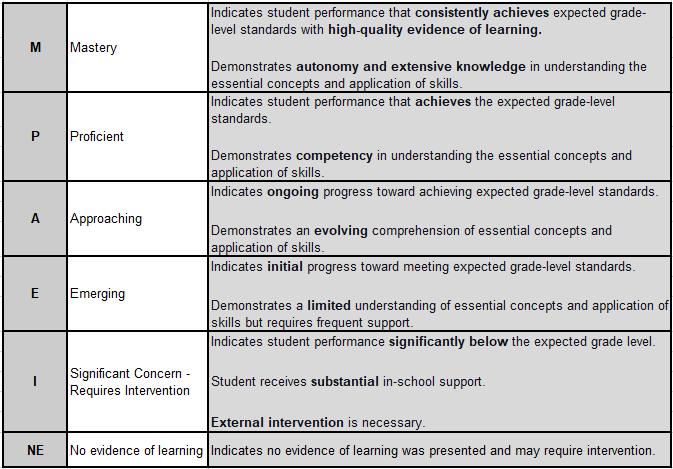
Interventions are conducted through collaborative meetings involving teachers and parents to help the student achieve the expected performance.
What time can I drop off my child at Chapel? How long can my child stay at school?
The entrance gate opens at 7:35 a.m. for student arrival and drop-off. Before this time, only staff vehicles are allowed on campus.
Elementary parents should arrive at school between 7:35 and 7:55 a.m. to ensure their children’s arrival time. Vehicles must use only the ES Lane 2, and must stay in single file. There should be no gaps from one vehicle to the next to expedite student drop-off. Drop-off begins at the first parking space before the second crosswalk, which is close to the main covered area.
Students will be dropped off and should be ready to step out of the vehicle with their backpacks in hand. We ask that adults remain in their cars at all times. Class assistants will open the vehicle door and assist students as they are dropped off. The gates close at 8:15 a.m., when all vehicles must leave the campus.
Students enrolled in an after-school activity will be dismissed at 4:30 p.m. Students not enrolled in such activities must be picked up at the regular dismissal time, 3:10 p.m.
How are the academic year and school vacations structured?
Because it is an American school, Chapel follows the calendar of the Northern Hemisphere: the school year begins in August and ends in June of the following year. There are two vacation periods: June/July and December/January. Chapel observes the Brazilian holidays.

Is it possible to enroll mid-year?
Yes, you can enroll at any time during the school year, subject to availability and approval through the admission process.
Is there a program for welcoming new students?
Yes. In Elementary School, the classroom community warmly welcomes new students. The Responsive Classroom Program has morning meetings designed to help new students adapt and connect, among other intentions. Since classes are re-assigned each year, the first weeks are dedicated to building a strong classroom community. Additionally, there is an orientation day for new students before the school year begins. On this day, they participate in integration activities, tour the school, and meet the counselors, principal, and classroom teachers.
How is the Portuguese language taught to foreign students?
Foreign students participate in the PLL (Portuguese Language Learners) program, designed to introduce them to the Portuguese language. The program employs a co-teaching model, where a teacher focuses on helping a foreign student learn Portuguese, while the student attends the same classes as their peers. Classmates are crucial in this process, since they act as facilitators and collaborators in the language acquisition journey. As foreign students progress in their understanding of Portuguese, they continue to receive tailored support based on their individual needs.
Does the school allow students to bring cell phones and other electronic devices?
In Elementary School, cell phones are not permitted. If you choose to allow your child to take a cell phone to school, it must remain off and stored in their backpack. Additionally, smartwatches should be kept at home to ensure that students focus on learning and building relationships in the classroom. If these devices are seen at school, the teacher will hold onto them until the end of the day, until a parent or responsible adult can pick them up. The only exception is for children who wear a smartwatch for medical reasons, such as monitoring blood sugar levels, or as prescribed by a doctor.
Elementary School students have access to Chromebooks during the school day and do not need to bring personal devices such as tablets and laptops to school. If any specific project or activity requires a personal device, the teacher will inform parents and request that the device be brought to school.

Mission Statement
In a caring and academically challenging environment, Chapel provides an American-style education to an international student body. Through Christian values, students learn to make informed decisions, to own responsibility for personal actions and community needs, and to respect life and cultural diversity.
Shared Vision Statement
Engage. Challenge. Support. Care. Prepare students for life.
Motto “Faith in Education.”
Definition of High-Quality Learning
“At Chapel School, learning is a collaborative and personal journey, crafted to suit the needs and strengths of each student. Rooted in research-based best practices and grounded in international and national curricula, our approach to learning encompasses a holistic view of student growth.
Learning extends beyond academic knowledge. It embraces the spiritual, socioemotional, cognitive, and physical dimensions of student development. Our learning process nurtures life skills while fostering critical and creative thinking, communication, and collaboration.
By cultivating a sense of responsibility and belonging, we empower our students to become active contributors to their communities. Learning has a higher purpose to positively impact society”.
Definition of Internationalism
“Chapel School is an accepting and inclusive environment that respects and embraces cultural uniqueness and diversity. We seek to create an open-minded community while making connections between different perspectives, beliefs, and nationalities to promote a sustainable future in all its dimensions.”

